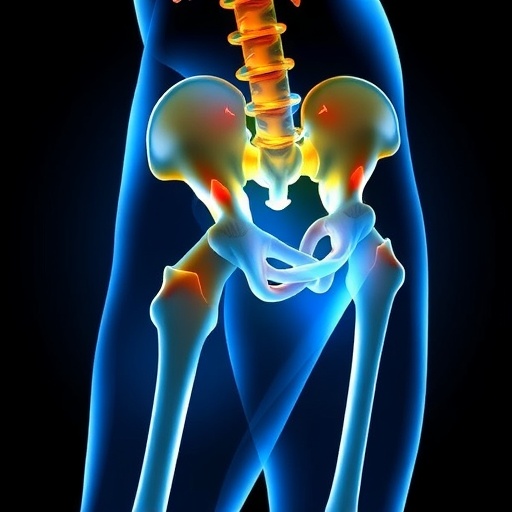In a groundbreaking exploration that extends the understanding of cognitive assessments in the context of hip fractures, a recent scoping review highlights the critical intersection between delirium and cognitive impairment as documented in national hip fracture registries. This research, spearheaded by a team of experts including N.A. Merriman, R.S. Penfold, and M.E. Walsh, pulls together a wealth of data that could reshape clinical practices and outcomes for elderly patients facing significant orthopedic surgeries and their aftermath.
Delirium, a sudden change in mental status that can manifest as confusion and disrupted attention, is alarmingly prevalent among older patients undergoing hip fracture surgeries. The implications of this condition extend beyond immediate hospitalization, complicating recovery and increasing long-term care needs. According to the findings of Merriman and colleagues, delirium not only poses a significant risk during hospitalization but is also tied deeply to the quality of cognitive assessment practices employed during the registration processes.
The researchers undertook a meticulous review of national registries, searching for patterns and efficacy in how cognitive assessments were integrated alongside delirium evaluations. By dissecting existing methodologies, the team brought to light various approaches that could either enhance or inhibit the accuracy of diagnostic measures. The findings suggest that a more standardized approach to both delirium and cognitive assessment may be needed to improve patient outcomes significantly.
One of the core findings of Merriman’s review was the recognition of inconsistency across national registries concerning how delirium is reported and recorded. The implications are profound: inconsistent documentation can lead to underdiagnosis or misdiagnosis, ultimately altering treatment trajectories for vulnerable populations. This revelation is crucial for healthcare systems aiming to cultivate quality in care outcomes by strategically addressing gaps in knowledge and practice regarding cognitive decline.
In analyzing cognitive assessments utilized in these registries, the review demonstrated a patchwork of methodologies across different facilities and regions. Some institutions employed rigorous multi-faceted assessments, while others relied on more simplistic, less informative measures. The diversity in assessment rigor speaks to a potential disparity in patient care across geographic locations, leading researchers to call for greater adherence to best practices and standardized cognitive testing protocols.
Merriman and his co-authors further emphasized the need for heightened awareness among clinicians regarding the prevalence of delirium in hip fracture patients. Their findings advocate for ongoing educational efforts that equip healthcare providers with the knowledge to recognize early delirium symptoms, thus allowing interventions to be initiated sooner, which can dramatically alter patient recovery trajectories.
The review also addressed the potential of utilizing digital health and telehealth tools to enhance cognitive assessments. The integration of technology into patient assessments may help standardize data collection in national registries, providing a more comprehensive understanding of delirium prevalence and impacts. As digitally enabled platforms become more commonplace, healthcare systems have an unprecedented opportunity to refine their processes and ultimately improve patient health outcomes.
Moreover, the discussion encapsulated in the review goes beyond immediate clinical implications; it extends to policy frameworks that govern healthcare practices. By advocating for policy changes that would prioritize delirium and cognitive assessment standards in national registries, the researchers suggest a pathway toward improved quality of care. They stress that integrating these elements into broader healthcare policies will likely lead to better-informed decisions made by healthcare professionals.
In terms of future research directions, Merriman and colleagues call for additional studies that delve deeper into the causes and long-term effects of delirium post-hip fracture surgery. They suggest longitudinal studies that follow patients over time to assess cognitive changes and the effectiveness of various treatment-intervention strategies.
The urgency of their findings resonates particularly within the context of an aging population; as the elderly demographic increases, so too do the complexities surrounding their health care. Delivering optimal care that addresses both physical and cognitive aspects is paramount, and this study’s insights may drive the call for systemic changes that benefit those most vulnerable.
In conclusion, the research by Merriman et al. serves as a clarion call to the medical community regarding the dual challenges of delirium and cognitive impairment in the realm of hip fracture care. By adhering to best practices, promoting educational initiatives for clinicians, and potentially deploying technology to harmonize assessment methodologies, significant strides can be achieved in tackling the challenges highlighted in this scoping review.
The implications of this work extend far beyond the clinical setting, touching on ethical, economic, and societal considerations as we move toward a future that must encompass the complexities of aging and cognitive health.
Subject of Research: Delirium and cognitive assessment in national hip fracture registries.
Article Title: Delirium and cognitive assessment in national hip fracture registries: a scoping review.
Article References:
Merriman, N.A., Penfold, R.S., Walsh, M.E. et al. Delirium and cognitive assessment in national hip fracture registries: a scoping review.
Eur Geriatr Med (2025). https://doi.org/10.1007/s41999-025-01246-4
Image Credits: AI Generated
DOI: 10.1007/s41999-025-01246-4
Keywords: Delirium, Cognitive Assessment, Hip Fracture, National Registries, Elderly Care.




